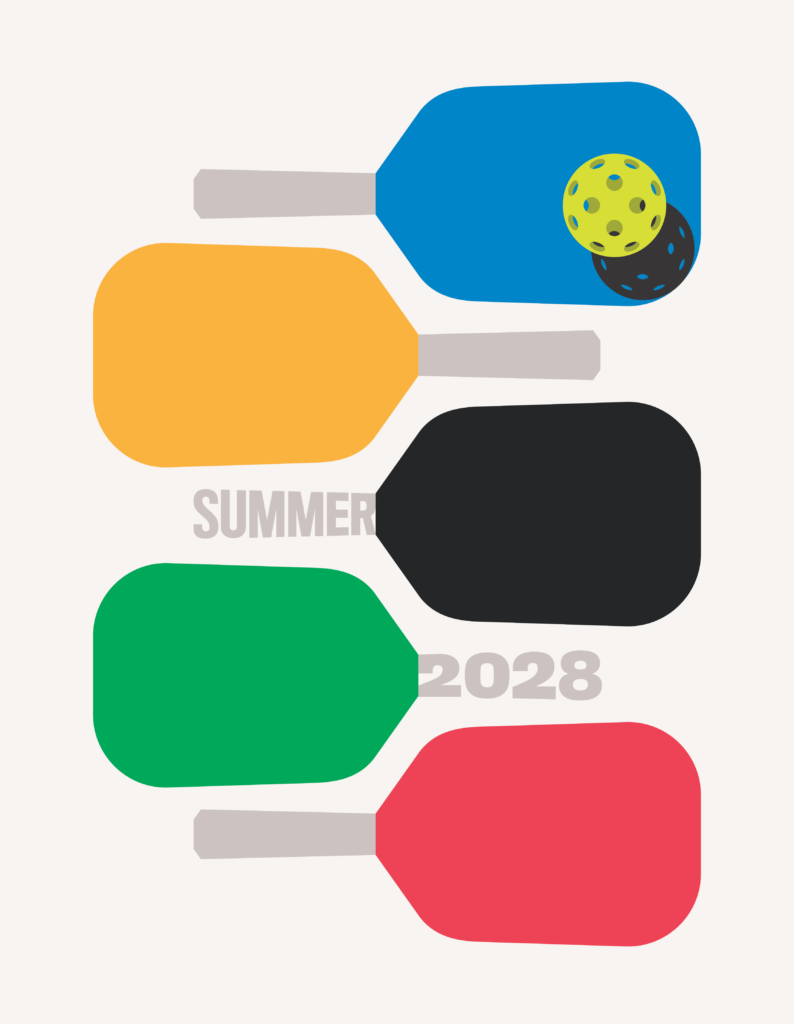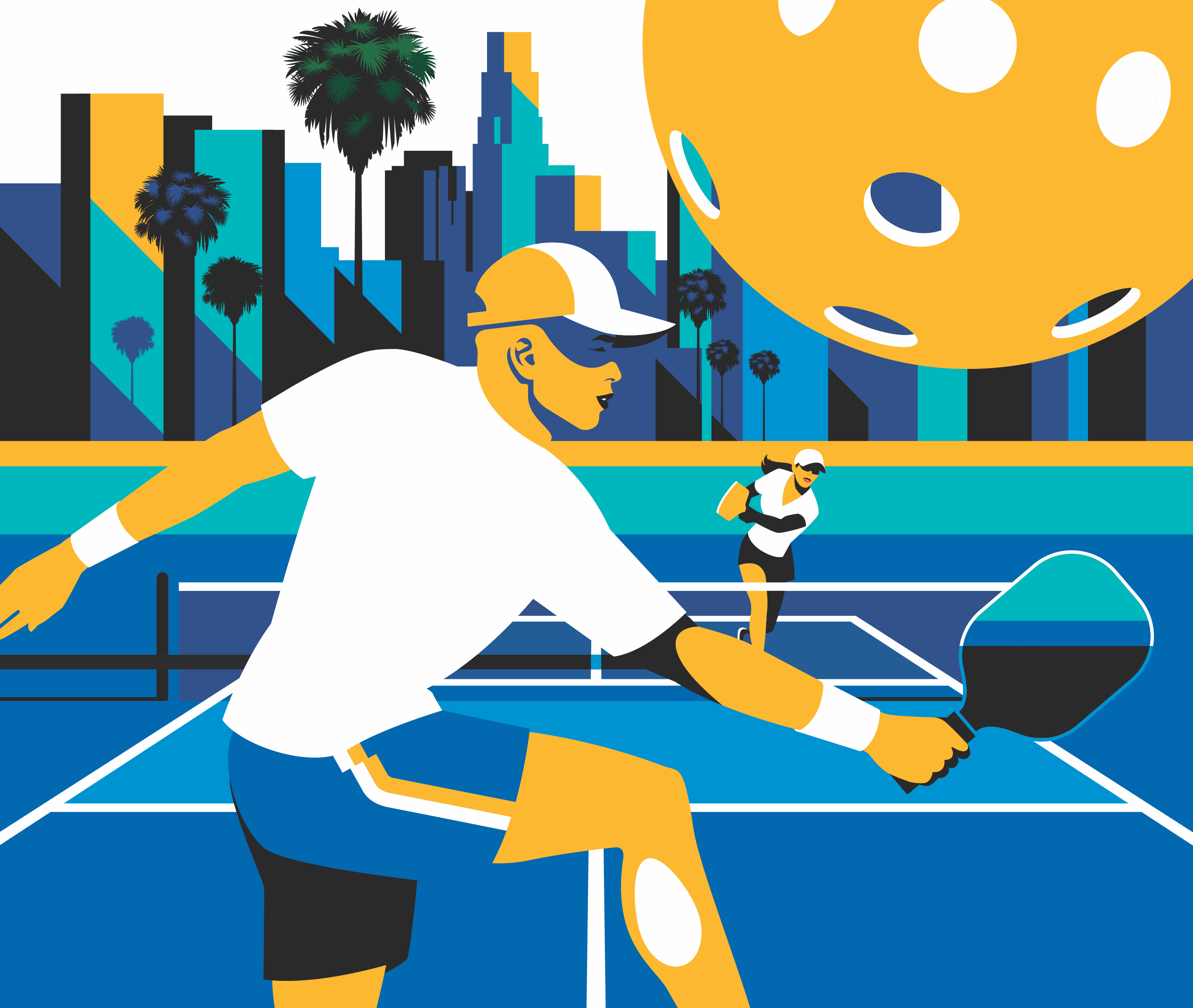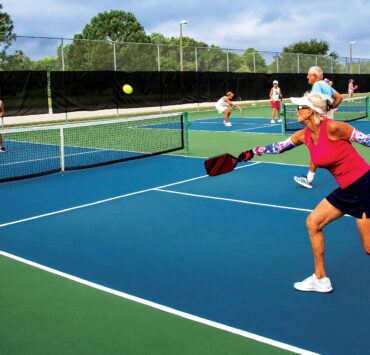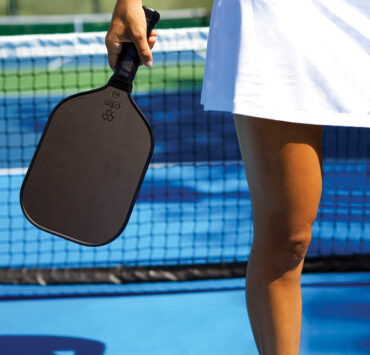Steve Sidwell has an Olympic dream.
But it isn’t to break the world record in the 100-meter sprint or take the gold medal in men’s gymnastics. Instead it is to see the game of pickleball take its rightful place as a competitive sport, ideally in the 2028 Los Angeles Games.
Sidwell is director of country membership for the International Federation of Pickleball, and one of his primary objectives is to get pickleball recognized as an Olympic sport and included in the Games. One factor in his favor: the sport’s global growth. “When I took over a couple of years ago, we had 18 member countries; now we have 61,” Sidwell says. “We need to have it actively played in 75 countries to get consideration for it becoming an International Olympic Committee sport; we’re coming along at a nice clip for that.” Pointing out that the International Federation of Pickleball’s member countries now range from the small (Tonga) to the huge (Russia), Sidwell adds, “We’re on all five continents.”

Also aligned with the IFP’s efforts to get pickleball accepted by the Olympic establishment are the USA Pickleball organization and AAU Pickleball, the pickleball arm of the Amateur Athletic Union, where many future Olympians get their start.
But the act of being embraced by the Olympics is not a simple one, even as the Games have become more welcoming to niche sports in recent years. In 2020, surfing, karate, sport climbing, and skateboarding all made their debuts (the last event making global stars of 19-year-old Sakura Yosozumi and 13-year-old Momiji Nishiya). In 2024, when the Summer Games move to Paris, break dancing will be in the gold-medal hunt.
Complicating the process is the fact that the International Olympic Committee’s own rules for acceptance are not exactly a model of clarity. When asked what it takes for a sport to be recognized by the Games, the IOC responded by referencing its general bylaws, and offering examples of sports that were recognized recently as having international federations, such as cheerleading, kickboxing, and lacrosse. “The IOC has no need to advertise,” explains Alan Abrahamson, a sportswriter who has covered the Olympics for 23 years, first at the Los Angeles Times and then on his Olympics- watching website, 3 Wire Sports. “Their attitude is, If you want to join our club, you’ll figure out how to do it.”
The act of being embraced by the Olympics is not a simple one, even as the Games have become more welcoming to niche sports in recent years.
What any non–International Olympic Committee sport needs to join the Olympic club is, frankly, persistence and time. As Abrahamson points out, “It took surfing the better part of 30 years to make its case.”
HURDLE ONE
IOC Recognition
“To get into the Olympics, you have to be recognized as an international federation,” Abrahamson says. “Second, the federation has to host a world championship. Third, that world championship has to attract a certain number of athletes from a certain number of countries over a certain number of years. Fourth, the federation has to make its case to the IOC over a certain number of years.”
Knocking off objections one through four is Sidwell’s reason for being. The International Federation of Pickleball is applying to become the recognized pickleball organization for the Global Association of International Sports Federations, which would make it pickleball’s official global representative. “We’re in good shape for that,” Sidwell says. “Then it’s a matter of the IOC recognizing pickleball as an Olympic sport.”
HURDLE TWO
Old-World Bias
Right now, Abrahamson believes, “pickleball is way too North American.” This is where the Los Angeles Olympics, planned for 2028, starts to seem like a viable side door into Olympic glory, by offering pickleball a kind of home court advantage. Every year, the host committee gets to propose a handful of sports whose participants will be allowed to compete for medals at those specific Games. In 2020, for example, “Tokyo wanted baseball and softball, and the IOC said OK,”Abrahamson says. “Paris did not want baseball and softball, so it’s out again. Paris did want break dancing, so it’s in for 2024. Beyond that? Who knows.”
These event-based sports are a slightly new twist to an old tradition. Stu Upson, CEO of USA Pickleball, the national governing body for pickleball, explains that until 1992, these host-committee- chosen contests were called demonstration sports and their participation was seen as a stepping stone to Olympic inclusion. For the 1988 Games in Seoul, bowling was a demonstration sport, back when Upson was executive director of the USA Bowling Congress. “What demonstration sports can potentially do is set up that sport for becoming an Olympic sport somewhere down the road,” Upson says.

“If we were able to do something in LA, I think we would have a decent chance… to become a core Olympic sport in the 2032.”
“Bowling never made it. But we’re digging around to see if there’s potential for pickleball to be an event-based sport in LA.” Current rumors indicate that the proposed event-based sports for LA are baseball, softball, cricket, and flag football. But as with all things IOC, “it’s kind of a secretive process,” Upson says.
If an event-based sport proves wildly popular, well attended, and attractive to sponsors, it has a shot at being asked to return. To that end, “if we were able to do something in LA, then I think we would have a decent chance of building our reputation and our presence around the globe to become a core Olympic sport in the 2032 Games in Brisbane, Australia,” Upson says. “It’s a very lengthy, complicated process, and we’re not there yet. ”
HURDLE THREE
The Incredible Shrinking Games
Debating which sports might be invited to the party in Los Angeles is all well and good. But it doesn’t change the fact that, as Abrahamson points out, “the IOC is in the process of trying to downsize rather than expand.” The shrinkage is largely an issue of dollars and sense; hosting the Olympics is turning out to be prohibitively expensive for many cities, so much so that the number of cities vying for the honor has decreased with every Games since 2004, when 11 bid.

Only two places ended up competing for the 2024 Olympics—Paris, which got the nod, and Los Angeles, which was immediately awarded the next Games. For 2032, the IOC simplified the process by handing the Games to Brisbane.
Pickleball enthusiasts argue that while the Olympics may want fewer sports because hosting them is pricey, it will want pickleball if the sport brings in more money than it costs. “It has to do with economics,” Upson says. “More sports means more athletes, dorms, venues, and everything. Something like baseball can be tough because you have 25 players on each team. Pickleball may have an advantage there, if they prefer to have sports that don’t have as many athletes on a team.”
“If you can resurface some tennis courts to have an Olympic event, don’t tell me someone wouldn’t say ‘Let’s get this thing in!’”
Another advantage? The fact that pickleball doesn’t require a stand-alone venue, like a $20 million velodrome, to be built. As Sidwell says, “If in two years there was even more international and U.S. interest, and you’re running the LA Games and you see that you can resurface some tennis courts to have an Olympic event, don’t tell me someone wouldn’t say ‘Let’s expedite this thing and get it in!’”
HURDLE FOUR
Golden-Agers Don’t Win Olympic Gold
Pickleball’s reputation as an easy-to-host sport may be a plus. The perception of it as an easy- to-play sport for seniors is, to put it mildly, not—especially as the Olympics seem to be trending ever younger. “If you look at the sports that were new in Tokyo— sport climbing, surfing, and skateboarding—those definitely skew young,” Upson says.
Pickleball has often been thought of as a game for people who are too old to play tennis, but that perception is definitely changing, thanks in part to people like Mike Nielsen, executive director of pickleball for the the Amateur Athletic Union, which trains young athletes in track and field, hockey, basketball, volleyball, and other sports, including, now, pickleball. “AAU has been getting their athletes— wrestlers, divers, gymnastics— in[to the Olympics] for 30 years,” Nielsen says. “Basically, I want to ride the AAU coattails to get pickleball into the Olympics. The mechanism is in place.”

Nielsen is also tapping manufacturers to help attract younger players. Paddletek, for example, is coming up with a youth program that “makes it easier for kids 15 and under to get into the sport,” says Curtis Smith, Paddletek’s chief executive officer.
“I would love to play in the Olympics,” Waters says. “I can’t imagine anything more exciting than representing my country through pickleball.”
Plus, Nielsen points to evidence that the sport is trending younger: “We have great athletes, like Anna Leigh Waters, who at 14 is tearing up the place. And I believe we really need to tap the youth and the young, the 20- and 30-year-olds.”
WATERS HERSELF, along with her playing-partner mother, Leigh, is definitely eager to compete for Olympic gold. “I would absolutely love to play in the Olympics one day,” she says. “I can’t imagine anything more exciting than representing my country through pickleball.”

“We still have a lot of work to get there,” her mother adds, “but for me to be able to coach Anna Leigh on the biggest stage would be amazing.”
As star players continue to draw attention to the game and organizations make an effort to get it to the Olympics, what can the average pickler do to facilitate turning the sport’s Olympic dreams into a reality? “Spread the word,” Sidwell says. “It’s a contagious sport. Every place you go, try to get more and more courts.”
Nielsen agrees, and envisions a path for pickleball that’s “kind of like skateboarding and snowboarding: It took a while to build that up. But once they got the ball rolling, it was electric. And pickleball is electric. Once you get addicted to it, it’s all over.”
While writer Abrahamson and some other Olympic watchers believe that pickleball’s aspirations are overly optimistic—Abrahamson puts the sport’s chance of getting into the Games at “zero”—pickleball enthusiasts insist that the real Olympic question for pickleball is not if the sport will make it to the Games but when. “We see the light,” Sidwell says. “It’s a big train, we’re riding it, and getting there is just a matter of time.”
InPickleball is not affiliated with the USOPC and is not a sponsor of the Olympic Games.



